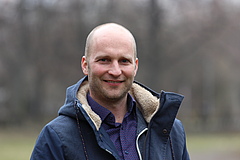28.05.2015 | Media Release, Theory in Biodiversity Science
Simulated climate change
Note for the media: Use of the pictures provided by iDiv is permitted for reports related to this media release only, and under the condition that credit is given to the picture originator.
Brose develops computer models that are able to investigate how modified environmental conditions or human land use impact on species diversity and ecosystem functions. "What will happen, for example, in complex food webs if the average temperature continues to significantly increase?" says the biologist, citing a current issue. "Until now we have always assumed that higher temperatures considerably increase the speed of growth processes in ecosystems," explains Brose. "This ought to result in the production of more biomass, which forms the basic food resource of many other organisms."
So more warmth means more food for everyone? Far from it. As Brose and his team were able to demonstrate using mathematical models and simulations, significantly increasing temperatures are in fact more likely to lead to famine: not only is the growth of plants stimulated by higher temperatures; respiration and degradation processes also intensify and more than offset the additional growth, according to the biologist.
In his research work, however, Brose does not simply focus on the theory. He reviews his theoretical analyses and prognoses again and again, with an eye to different connections between species diversity, environmental conditions and ecosystem functions, also in experiments. He works in line with the motto that every theory has to be based on verified, experimental data and every experiment has to be theoretically founded. Besides the impact of environmental factors on the stability and functionality of ecological networks, his research work also sets out to ascertain, among other things, how land use can be transformed in a way that will maintain the biodiversity and functionality of natural ecosystems in the long term. In order to do this, he has found an ideal research environment in the iDiv, where the Frankfurt-born scientist already feels very much at home.
Ulrich Brose studied biology in Frankfurt and Hamburg before moving to the University of Potsdam to write his PhD thesis; he gained his doctorate in 2001. A Leopoldina Scholarship then allowed him the opportunity to move to San Francisco State University for a three-year research stay. He returned to Germany in 2004 and, until 2009, led an Emmy Noether group at the German Research Foundation (DFG) on complex ecological networks at the University of Darmstadt, where he also habilitated in 2008. After receiving a DFG Heisenberg Scholarship, Brose moved to the University of Göttingen in 2010 before accepting the chair at the FSU. Contact:
Prof. Dr. Ulrich Brose
Institute of Ecology, Friedrich Schiller University Jena (FSU)
German Centre for Integrative Biodiversity Research (iDiv)
Deutscher Platz 5e, 04103 Leipzig
Phone: +49 341 / 9733 205
Email: ulrich.brose@idiv.dePress Offices:
Dr. Ute Schönfelder (Press Officer FSU)
Phone: +49 3641 / 93 10 41
Email: presse@uni-jena.de
Annette Mihatsch (Press Officer iDiv)
Tel.: +49 341 / 9733 106
Email: presse@idiv.deDownload press release (PDF) ›

